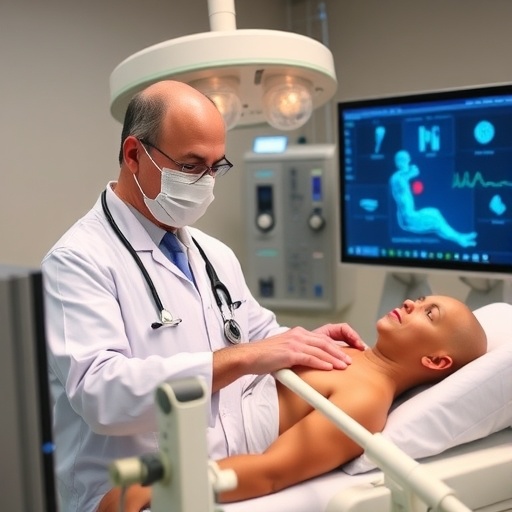In recent years, the field of healthcare training has undergone a significant transformation, particularly in low- and middle-income countries. A comprehensive systematic literature review conducted by Ferreira, Generoso, Marra, and colleagues discusses the effectiveness of low-cost, technology-enhanced simulation training as a viable solution for healthcare education in these regions. This innovative approach has made notable strides in addressing critical gaps in healthcare professional training, ultimately aiming to improve patient outcomes and healthcare delivery in settings with limited resources.
Simulation training has become an integral part of medical education globally. However, its implementation in low- and middle-income countries (LMICs) presents unique challenges and opportunities. The systematic review sheds light on the increasing adoption of educational technologies that utilize low-cost simulation techniques to provide high-quality training. By offering hands-on experience in a controlled environment, these simulations allow healthcare professionals to practice and refine their skills without the pressure of affecting patient safety.
One of the most significant advantages of low-cost, technology-enhanced simulation training is its adaptability to various medical disciplines. The ability to customize training modules to reflect local health challenges makes these simulations particularly relevant to the specific needs of healthcare workers in LMICs. This tailoring ensures that professionals acquire not just general medical knowledge, but also the practical skills necessary to enhance care delivery in their communities.
Moreover, the systematic review highlights the growing body of evidence supporting the efficacy of simulation-based learning compared to traditional methods of education. Research consistently demonstrates that immersive, hands-on training leads to improved retention of medical knowledge and proficiency in clinical skills. For healthcare workers operating in resource-limited settings, this can mean the difference between effectively managing emergencies or succumbing to systemic healthcare challenges that degrade patient care.
The advent of technology has enabled the creation of cost-effective simulation tools that can mimic real-life scenarios. Virtual reality (VR), augmented reality (AR), and computer-based simulations are among the innovative technologies utilized in this training. These platforms not only enhance learning experiences but also provide opportunities for debriefing and feedback, which are crucial for developing clinical competencies.
In addition to these technological advancements, collaborative approaches involving local healthcare institutions have been pivotal in fostering an environment conducive to effective training. Partnerships between universities, hospitals, and non-governmental organizations have proven essential in both the implementation and evaluation phases of technology-enhanced simulation training programs. Such collaborations also facilitate resource sharing, further magnifying the positive impact on healthcare training.
Despite these advancements, barriers still exist that hinder the widespread implementation of simulation training in LMICs. These challenges include limited access to technology, inadequate infrastructure, and the need for trained facilitators who can effectively run these programs. The review underlines the importance of addressing these barriers to maximize the potential of simulation training in transforming healthcare education.
A key takeaway from the literature review is the recognition that sustainability is vital for the long-term success of simulation training initiatives. This involves not only the continued investment in technology and resources but also the building of a culture of continuous learning within healthcare systems. Engaging stakeholders at every level ensures that training programs remain relevant and evolve with the changing healthcare landscape.
The review also emphasizes the critical role of evaluation in enhancing training programs. By systematically assessing the effectiveness of simulation training, stakeholders can identify strengths and areas for improvement. This iterative process is crucial in developing evidence-based practices and ensuring that training programs can adapt to the dynamic needs of healthcare providers and the populations they serve.
Moreover, the implications of the findings extend beyond the immediate context of healthcare training. Increased capacity of healthcare providers in LMICs will have a ripple effect on public health, contributing to better health outcomes and increased resilience against future healthcare crises. As the world continues to grapple with the consequences of pandemics and other health emergencies, the importance of well-trained healthcare personnel remains more pressing than ever.
In summary, the systematic review by Ferreira and colleagues illustrates the transformative potential of low-cost, technology-enhanced simulation training in the context of LMICs. By bridging the gap in healthcare training through innovative, accessible methods, these programs offer a hopeful pathway toward improving the quality of care and overall health system performance.
As healthcare training continues to evolve, it is imperative for policymakers, educators, and healthcare institutions to embrace and invest in these advancements. Doing so will not only enhance clinical skills among healthcare professionals but will ultimately contribute to the vitality of healthcare systems in low- and middle-income countries.
By recognizing the significance of low-cost, technology-enhanced simulation training, the global community can work together to foster an environment of shared knowledge and resources. This collaboration will be essential in empowering healthcare workers and ensuring that they are equipped to meet the needs of the populations they serve effectively and efficiently.
Together, through systematic efforts to implement and sustain these training programs, we can elevate healthcare education, confront the challenges of modern healthcare landscapes, and secure a healthier future for all.
Subject of Research: Effectiveness of low-cost, technology-enhanced simulation training for healthcare training in low- and middle-income countries.
Article Title: Effectiveness of Low-cost, Technology-enhanced Simulation Training for Healthcare Training in Low—and Middle-income Countries (LMICs): A Systematic Literature Review.
Article References:
Ferreira, J.M.G., Generoso, J.R., Marra, A.R. et al. Effectiveness of Low-cost, Technology-enhanced Simulation Training for Healthcare Training in Low—and Middle-income Countries (LMICs): A Systematic Literature Review.
J GEN INTERN MED (2025). https://doi.org/10.1007/s11606-025-09794-y
Image Credits: AI Generated
DOI: 10.1007/s11606-025-09794-y
Keywords: simulation training, healthcare education, low-cost technology, low-and middle-income countries, systematic literature review, medical training, clinical competencies.
Tags: affordable healthcare trainingchallenges in healthcare educationcustomizable training moduleseducational technologies in healthcarehands-on experience in medical traininghealthcare delivery in resource-limited settingshealthcare training in LMICsinnovative training solutionslow-cost medical educationpatient outcome improvementskills refinement for healthcare professionalstechnology-enhanced simulation





